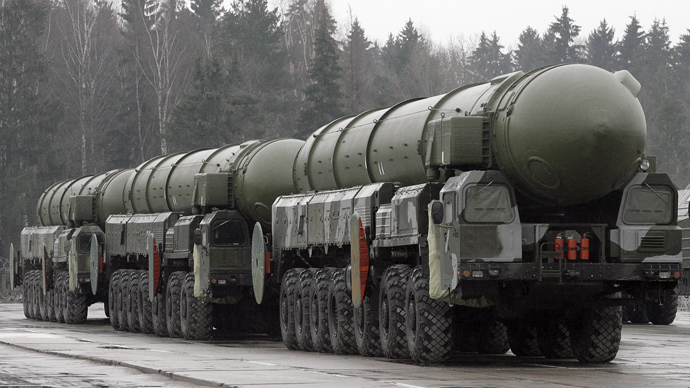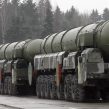
Moscow Prepares Revised Military Doctrine
Publication: Eurasia Daily Monitor Volume: 11 Issue: 157
By:

Russian President Vladimir Putin undoubtedly timed the coordinated effort to initiate a ceasefire in southeastern Ukraine to coincide with both the North Atlantic Treaty Organization’s (NATO) September 4-5 summit in Newport, Wales, and the European Union’s threat of additional sanctions against his country. However, due to the downturn in relations with the Alliance since the annexation of Crimea and ongoing Russian involvement in the Ukraine crisis, Moscow has also signaled its own counter-response, though consigned to the doctrinal security policy level. Senior Russian defense officials confirmed in early September that the 2010 Military Doctrine will now be revised by the end of the year. This is allegedly driven by NATO enlargement, its military infrastructure “gradually” increasing close to Russia’s borders, the United States’ missile defense system and, of course, the crisis in Ukraine (Inosmi.ru, September 4).
Moscow’s plans to revise its current Military Doctrine has prompted the usual speculation among Russian commentators trying to determine how it might change, and whether it could include indications of a further deterioration in the country’s relations with the West. Prior to then-president Dmitry Medvedev signing the latest Military Doctrine into law in February 2010, both foreign and Russian analysts differed over the nuclear dimension of the doctrine. In any case, the potentially controversial nuclear elements were either entirely redacted or placed in a classified addendum to the 2010 Doctrine (see EDM, February 23, 2010; The Moscow Times, September 3).
Nonetheless, on September 5, the former chief of the General Staff (CGS), Army-General (retired) Yury Baluyevskiy, dismissed media reports that the revisions to the doctrine could include “preventative nuclear strikes” in its clauses. Baluyevskiy categorically denied this assertion, saying it will not be considered. And he added that “the use of nuclear weapons will only be retaliatory” (RIA Novosti, September 5). The source of the denial is important since he has been assigned a role in his retirement to work on the project.
Baluyevskiy confirmed that he is a member of the working group under the Russian Security Council tasked with formulating the amendments to the doctrine. The Security Council also indicated that the changes will touch on the independence of Russia in producing its own weapons and hardware. The former CGS explained: “First of all, it is not an issue of creating a new doctrine, but of amending the existing one. Where in the doctrine is the provision about preventive nuclear strikes? I recommend reading it carefully one more time […] especially Article 22. The issue of preventive nuclear strikes is not considered” (RIA Novosti, September 5).
The “leak” from the defense ministry, followed by Baluyevskiy rebuffing the nuclear pre-emption issue, seems deliberate. Yet, Moscow-based experts were also quick to highlight a broader range of internal structural issues such as changes within the Russian Armed Forces since 2010, in addition to international developments ranging from the Arab Spring to the Syrian civil war (Ekspert, September 2; The Moscow Times, September 3). Nonetheless, the Military Doctrine amendment process is clearly timed to include recent developments in Crimea and southeastern Ukraine, possibly updating the document’s references to the United States and NATO. The 2010 Military Doctrine framed the designation of NATO in diplomatic language, and it may be the case that the hawks within the Russian security elite will now push for an outright clarification on this issue.
Perhaps one worrisome indication of the mood prevailing in these circles, buoyed by the annexation of Crimea and the recent routing of the Ukrainian anti-terrorist operation (ATO) came in a recent article by Vasily Kashin, an analyst with the Center for Analysis of Strategies and Technologies (CAST) in Moscow. Kashin argued that by the end of 2014, a new cold war would commence, and that Russia will not be defeated (The Moscow Times, September 1).
Although there is much scope for miscalculations based on an overly optimistic interpretation of Russian successes, in this wider context, the 2010 Military Doctrine may indeed have required some adjustments. It was after all, crafted within a very different security environment since it was ordered in 2005 by Putin; when it was released nearly five years later, the doctrine seemed to be largely a compromise statement on how Moscow views its threat environment. Fyodor Lukyanov, the editor of Russia in Global Affairs, believes that the issue of US-Russia relations should not be exaggerated; these bilateral ties, he argued, will not (unlike during the Cold War) retain their strategic importance. Lukyanov sees the precise wording of the amended doctrine later this year likely to reflect how NATO formulated its own stance on Russia, in Newport (Ekspert, September 2).
Splitting hairs over precise words or terms, and the potential for this to mean little in practical terms is also a theme explored by Aleksandr Khramchikin, the deputy director of the Moscow-based Institute of Political and Military Analysis. For example, in response to NATO’s plans to open bases in the Baltic States, Poland and Romania, the author argues that Moscow will present a long planned replacement of Tochka-U assets with modern Iskanders as its answer to these token bases (Nezavisimoye Voyennoye Obozreniye, September 5).
In any case, it is highly unusual to restrict the work on the doctrine to a set of mere amendments, and its timescale implies perhaps a rushed job. What emerges from this process may offer further insight into how the Kremlin sees the long-term implications of the Ukraine crisis. It could also offer more doctrinal underpinning for the evolving Russian concept of hybrid or linear warfare. But it may not provide the clarity that many would demand. With NATO-Russia relations effectively frozen over the Ukraine crisis, a growing set of US and EU sanctions on Russia, and the ceasefire in Donbas struggling to hold, the Kremlin appears anxious to frame at least part of its response in law.




